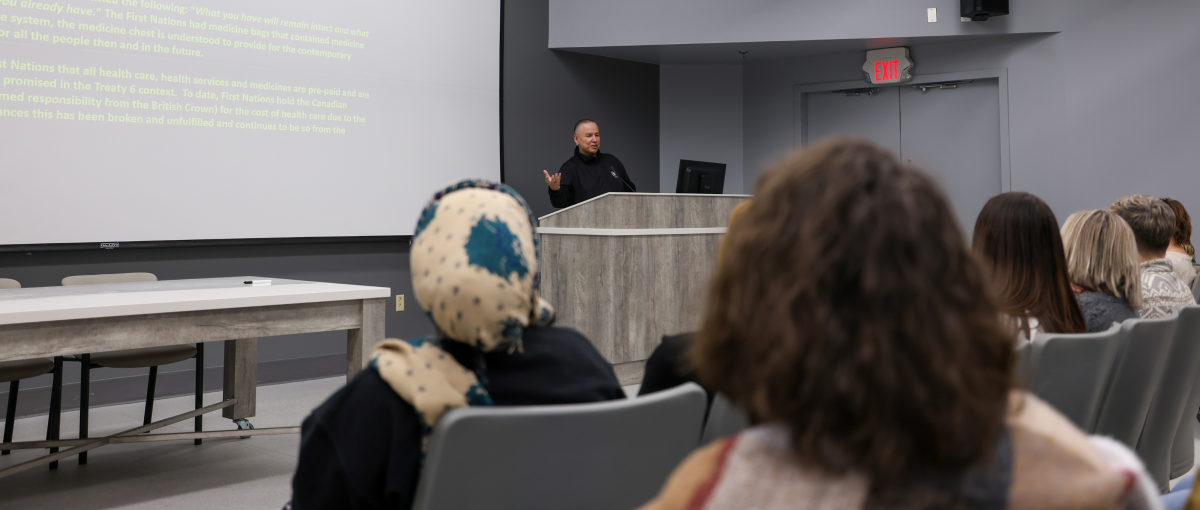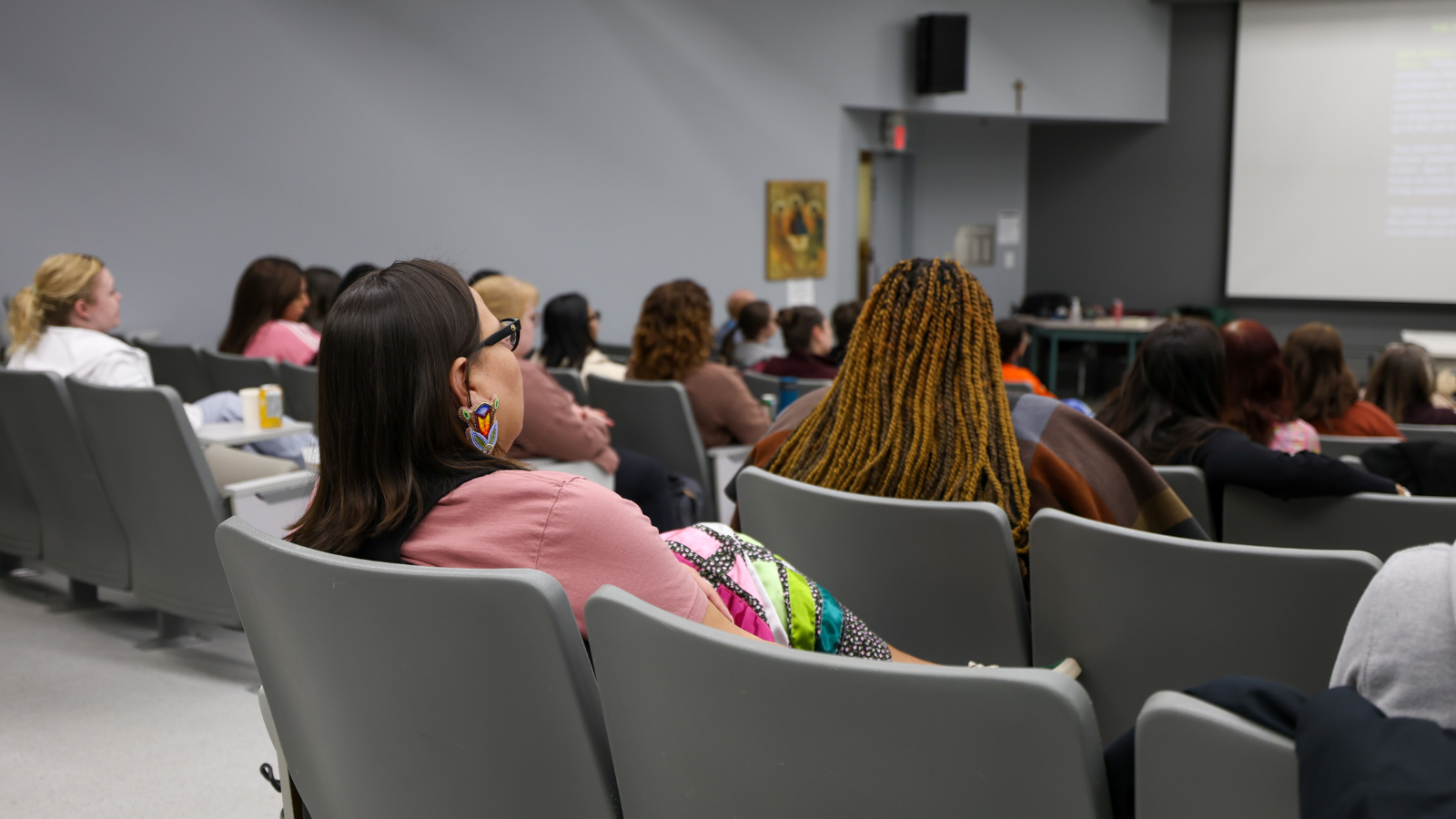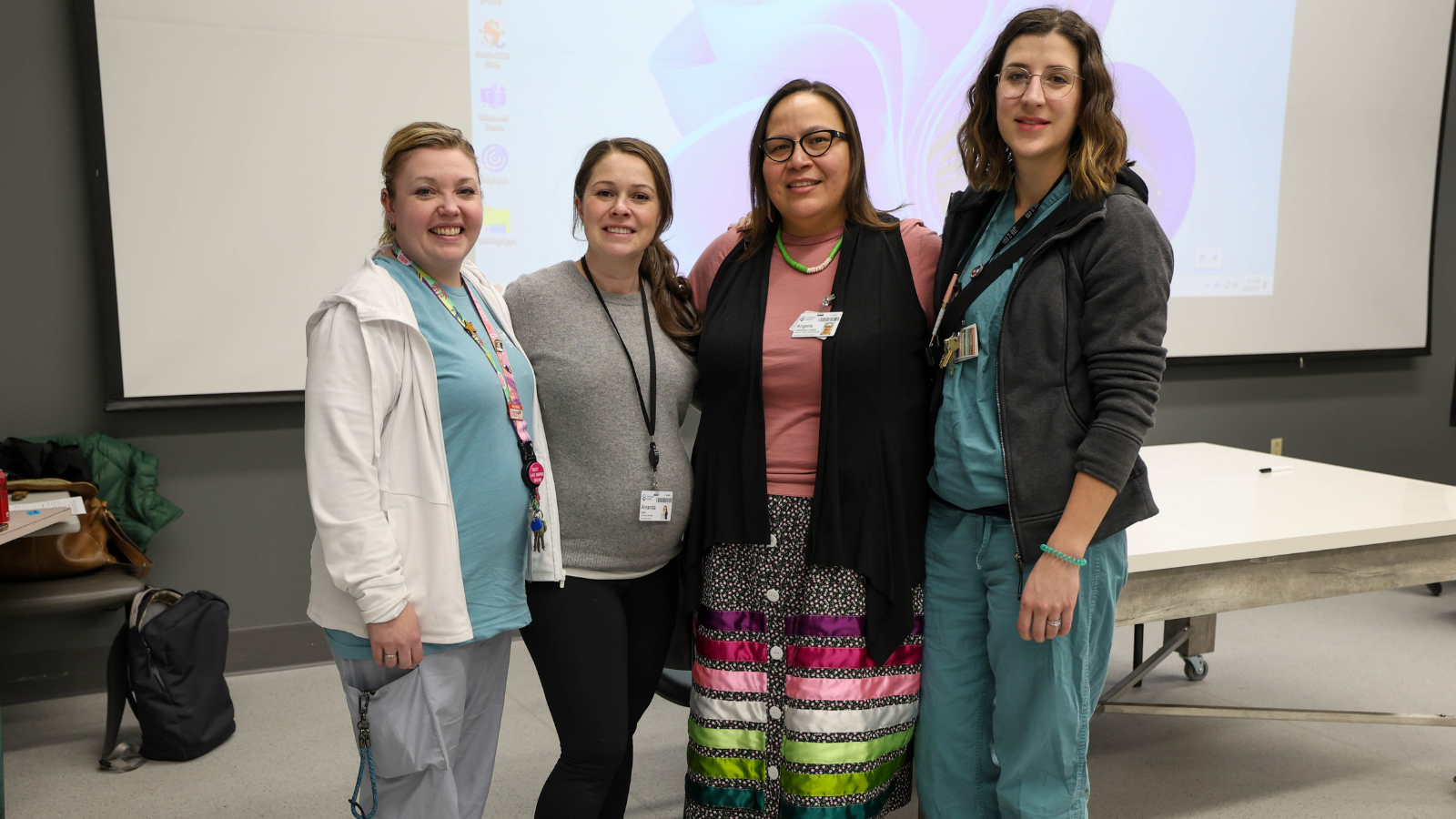Indigenous Health Education Days foster traditional knowledge and cultural understanding

September 4, 2025
By Jocelyn Wady, communications advisor
For Rain Bautista, a registered nurse at Villa Caritas, a Covenant Health site in Edmonton, learning about Indigenous health and wellness is a personal and professional opportunity.
“I want to be able to provide culturally safe care to my patients, especially when I have Indigenous patients because I want to be inclusive in my care,” says Rain, who immigrated to Canada from the Philippines and was surprised by the lack of Indigenous history in his citizenship education.
Nick Hillier, assistant head nurse in the intensive care unit at the Misericordia Community Hospital, echoes the importance of culturally appropriate care. “Learning about the experiences of Indigenous Peoples, having a better idea of their perspective and having better cultural competence are important for my job,” he says. “But they’re also important (for) a Canadian citizen who wants to do better for our shared land.”
These personal and professional concerns prompted Rain and Nick to participate in Covenant Health’s Indigenous Health Education Days held this past February. Through immersive, in-person experiences, the program introduced staff to traditional teachings, cultural practices and the lived experiences of First Nations, Inuit and Métis Peoples. The sessions were designed to address anti-Indigenous racism in health care and to promote culturally safe, person-centred care.
“Indigenous Peoples have been here since time immemorial with very strong systems in place — our own political, education, judicial and healthcare systems, with our own spirituality and teachings,” says Amber Ruben, Indigenous health equity and reconciliation consultant, who initiated the Indigenous Health Education Days at Covenant. “I wanted to bring in some of that strength, resilience and Indigenous worldview and to promote our perspectives of health and wellness.”
Amber is a career Inuvialuk pharmacist from Treaty 8 territory in the Northwest Territories who now works with Covenant Health to advocate, raise awareness and drive change for Indigenous Peoples. She recognized the need to give staff deeper, more personal learning opportunities beyond virtual modules.
“Although the CLiC (virtual) modules have their place in terms of Indigenous awareness training, it can't be one and done, and a lot of folks prefer in-person learning,” she says. “We needed to find other ways to bring this education to the organization because the profound impact of colonization and the teachings about our cultures can’t be taught in module format.”
Amber recommended in-person training that incorporates storytelling — a key element in Indigenous knowledge sharing. The result was Indigenous Health Education Days, held at the Misericordia and Grey Nuns community hospitals and the Edmonton General Continuing Care Centre, which offered staff a chance to learn directly from Indigenous individuals and Knowledge Keepers.
“If you bring in things like storytelling, that allows for that Indigenous perspective to shine through,” says Amber. “Hearing people’s stories has that ability to make an impact."

The sessions were held in person to give staff a chance to learn directly from Indigenous individuals and Knowledge Keepers.
The program featured teachings on traditional medicines and the Medicine Wheel, Indigenous games and their cultural significance, and treaty history and relationships. It also included a simulation scenario reflecting the lived experience of an Indigenous person in the healthcare system, followed by a Truth and Reconciliation discussion circle. Each day started with a prayer, and a drummer provided an opening song. Everyone had the opportunity to smudge during the traditional medicine teaching and to ask Creator or their own God to have them see, hear and speak in a good way and open their minds and hearts to the teachings provided.
Lyndon Suntjens, who teaches youth in Enoch Cree Nation and has a master’s degree in Indigenous land-based education, led the session on Indigenous games. Indigenous games incorporate movement, agility and strength while fostering community connection and cultural continuity, he says. They offer a meaningful way to engage with ancestral knowledge and skills that have supported Indigenous ways of life for generations.
“The sessions are about Indigenous ways of knowing and being — knowledge that we are sharing with a lot of people who have missed it in their education process,” says Lyndon. “(The games) are just a little way to share the beauty of our culture, our customs, our ceremonies.”
The live simulation session featuring a healthcare scenario involving an Indigenous patient was facilitated by Charlotte Oostveen and the Covenant Health simulation team, as well as Indigenous staff. Following the simulation, participants engaged in reflective small group discussions modelled after a sharing circle, supported by the ceremonial passing of a sharing branch to ensure all voices were heard.

(From left): Leslie Pallier Winter, Amanda Tozer, Angela Parisian and Charlotte Oostveen were some of the many staff who participated in the Indigenous Health Education Days sessions.
“Not only was it a beautiful day of community and learning, but I think as healthcare professionals working with Indigenous Peoples, we are obligated to have education around Indigenous health issues and Indigenous health discrepancies,” says Charlotte, simulation lead at Covenant Health. “Attending this training is part of that obligation to do good for people and to make sure we're educated and providing safe care.”
Both Rain and Nick say the sessions offered a meaningful chance to connect with the stories and the storytellers and they’re eager to apply what they’ve learned in their work and beyond.
“The day was an amazing learning opportunity; it was well-organized, interesting, informative — it inspired me to learn more,” says Nick.
Amber is encouraged by the positive feedback received from participants and hopes to continue offering similar events.
“There's still a lot of opportunity to try and implement Indigenous perspectives and to ensure that we're not continuing to do harm to Indigenous Peoples,” she says. “As humans, we really connect with people through stories, through arts, and it’s a great way to bring Indigenous health education to the forefront.”